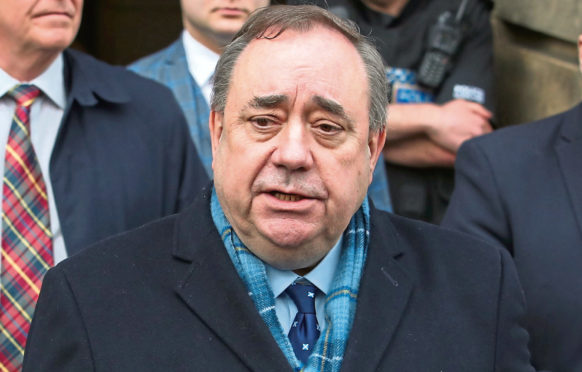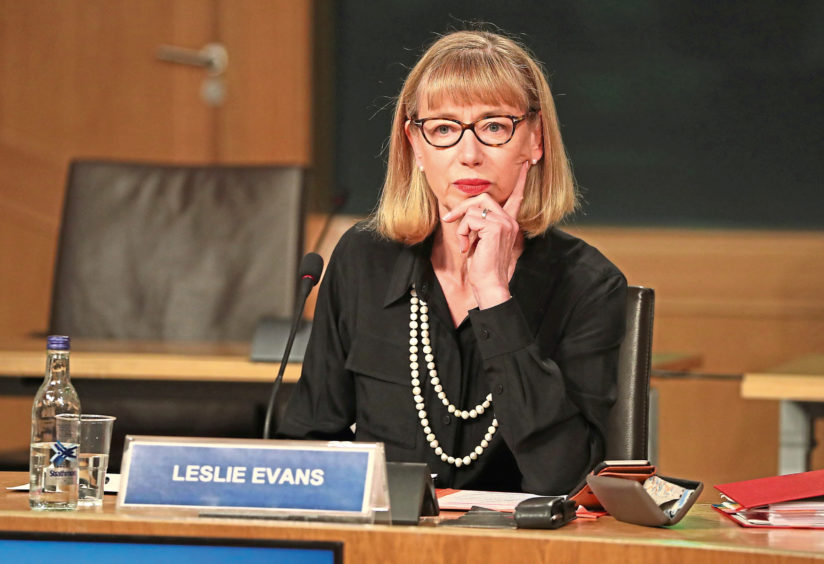
It has been an inquiry marked by unreadable documents and opaque answers, of redaction, unminuted meetings and memory loss.
Today, civil servants’ evidence to the inquiry into the botched handling of complaints against Alex Salmond is compared to Oliver North’s infamous testimony to the US Congress about the Iran-Contra scandal.
MSPs on the Holyrood committee investigating the Scottish Government’s handling of harassment complaints are becoming increasingly frustrated at the lack of openness by witnesses.
One compared their evidence to that of White House aide Lt. Col. North, who sold missiles clandes-tinely to Iran to fund anti-Sandinista guerrillas in Nicaragua, who repeatedly answered to questions: “I can’t recall.”
Former First Minister Alex Salmond was awarded £512,250 in legal expenses last year after the Scottish Government’s handling of two complaints against him was ruled “tainted by apparent bias”.
Committee member and Lib Dem MSP Alex Cole-Hamilton said: “We are looking for clarity around the context in which the procedure was drafted.
“But we have repeatedly encountered misdirection, absence of memory on the part of witnesses and in some cases abject silence.
“There have been so many times we have heard the phrase ‘I can’t recall’ that it is starting to feel like Oliver North’s testimony about the Iran-Contra scandal. Civil servants need to realise that co-operation with our work is not optional. They are under oath and the eyes of the country are on them.
“The committee has powers under Section 23 of the Scotland Act to compel reluctant witnesses, but we want to act in good faith and work with witnesses to get to the facts.”
The committee began taking evidence from civil servants last month. Permanent Secretary Leslie Evans, her predecessor Sir Peter Housden and Lord Advocate James Wolffe have all declined to answer some questions while curtailing their answers to others, citing often vague reasons of confidentiality.
The lack of light shed during the hearings is replicated in the documents passed to the committee after weeks of delay which are heavily redacted to the point of being worthless. Possibly important meetings are apparently unminuted, with who was there, never mind what was said, apparently unknowable.
Labour MSP and committee member Jackie Baillie said: “It is extraordinary, given the length of time they have had to prepare, that witnesses – particularly the Permanent Secretary – are unable to recall what happened or who was in the room at the time.
“It is quite extraordinary that something of this importance merits that kind of treatment. One could be forgiven for thinking that there was something to hide.”
Committee members have also been frustrated at the limited evidence provided by the Scottish Government, with key documents redacted on the grounds they concerned legal advice and were therefore legally privileged.
Ministers argue it would undermine their ability to seek such advice in future, even though advice has previously been provided to inquiries into Scottish child abuse, UK infected blood and the Edinburgh trams project.
Adding to concerns around transparency, the Wings Over Scotland website suggested the Scottish Government had deliberately made it difficult to find Freedom of Information requests relating to the Salmond Inquiry on its website.
Ms Baillie said: “Despite the Scottish Government saying they willing co-operate with the committee, our experience has been the exact opposite.
“At every turn, information has not been provided or is missing from the paperwork, or witnesses find it difficult to recall major events. Now we are faced with delays in getting information requested and the withholding of legal advice which is central to the committee’s remit. They promised to be open and transparent and we are left wondering what they are hiding because they haven’t provided the information that we need to do decent job.”
Former first minister Alex Salmond and his successor Nicola Sturgeon are also set to give evidence to the committee. Last week, it emerged Mr Salmond’s lawyers had been warned by the Crown Office that handing documents to the committee obtained during legal proceedings could risk contempt of court proceedings.
His lawyer David McKie wrote that Mr Salmond had been warned by the Crown Office “in the strongest terms” that it would be a “criminal offence” to release certain restricted material.
The Scottish Government and Mr Salmond have now agreed the release of a redacted 120-page “open record” of the two sides’ pleadings. It is being reviewed by committee members before their next meeting on Tuesday.
After winning his legal challenge against the Scottish Government’s handling of two complaints, Mr Salmond was prosecuted for a series of alleged sexual assaults.
After trial at the High Court in Edinburgh in March, he was cleared of 13 charges. Meanwhile, SNP chief executive Peter Murrell, who is married to the First Minister, has claimed she did not tell him about the complaints against Mr Salmond despite at least one meeting being held at their home.
The MSPs’ committee wants to know when Ms Sturgeon knew of the Salmond allegations and when and why she met him and his representatives but say, so far, it has been impossible to pin that down with any certainty.
Mr Murrell, who will also appear before the committee, said in a letter to MSPs he did not know complaints had been made against Mr Salmond under the Scottish Government procedure until the matter became public in August 2018. He did know about meetings between Ms Sturgeon and Mr Salmond at their family home on April 2 and July 14, 2018, but said his wife told him she could not discuss the details and he did not press her further.
Leaked WhatsApp messages appeared to show him backing police action against Mr Salmond. The messages appear to have been sent in January, 2019 after Mr Salmond had appeared in court charged with sexual offences.
The Scottish Government said: “In the normal course of business not all conversations and meetings are minuted. Where decisions or commissions arise they are recorded for action or the official record as necessary. The government is cooperating fully with the committee to provide relevant information and will continue to do so.”
So many questions
September 8
Were you consulted on it? [legal advice to a parliamentary inquiry]
Lord Advocate James Wolffe: I could not possibly comment on whether I was or was not.
September 8
It was reported that, after the conclusion of the judicial review case, you sent a text message to a colleague that contained the words: “We may have lost the battle but we will win the war.” What did you mean by that?
Leslie Evans: That has been misinterpreted as having some kind of conspiratorial element to it. I clearly say that that is not the case.
I have been working, since I was first appointed as permanent secretary on July 1, 2015, to make the organisation a more inclusive and diverse one that respects everybody’s right to come to work and have the right kind of conditions at work. I have worked to ensure that equality is at the heart of the business of government, and also at the heart of the organisational culture.
I was not referring to any individual when I sent that text. I was talking about a long-term commitment of mine, and indeed of the Scottish Government – as you will see from its policy documents – to ensure that equality lies at the heart of what it does and of how it operates as an organisation.
September 15
For the avoidance of doubt, did you speak to the Deputy First Minister about any of those harassment complaints?
Sir Peter Housden: I am not able to go into specifics in terms of individuals.

Enjoy the convenience of having The Sunday Post delivered as a digital ePaper straight to your smartphone, tablet or computer.
Subscribe for only £5.49 a month and enjoy all the benefits of the printed paper as a digital replica.
Subscribe © PA
© PA